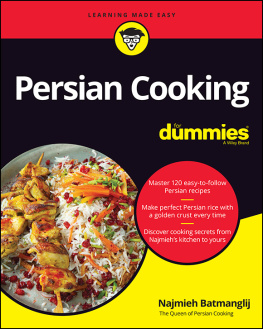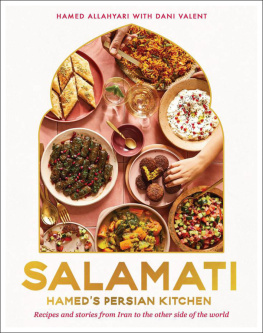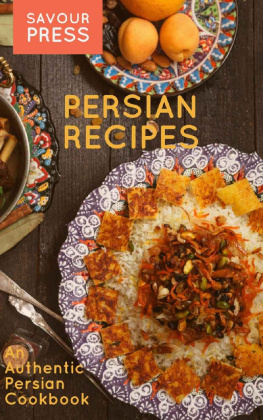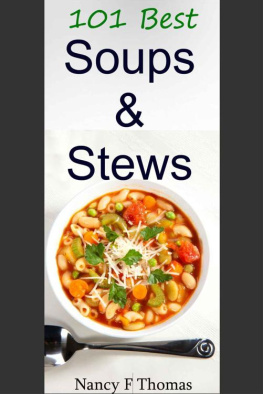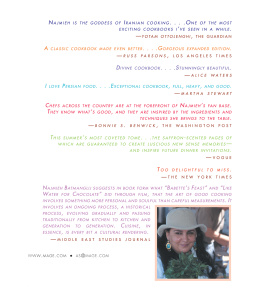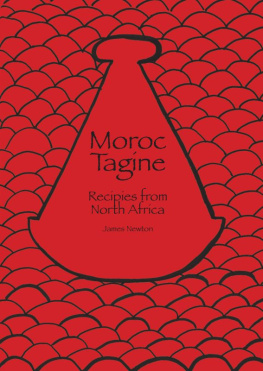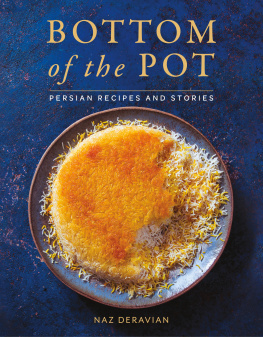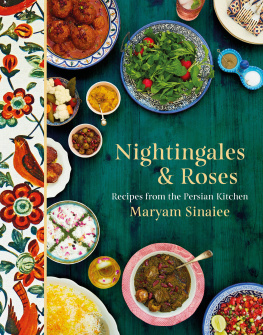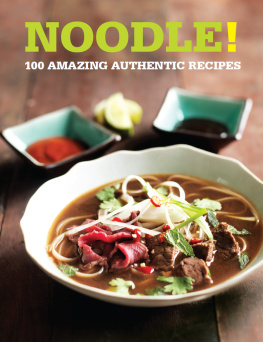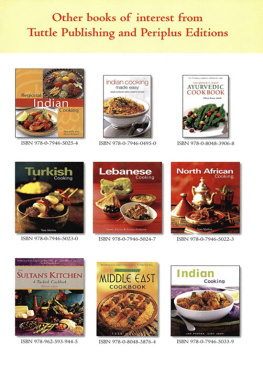NIGHTINGALES & ROSES
Recipes from the Persian Kitchen
Maryam Sinaiee
AN ANIMA BOOK
www.headofzeus.com
Nightingales and Roses offers you a true taste of Persian home cooking. Iranian food blogger and cook, Maryam Sinaiee, takes us through a full year in the Persian kitchen, explaining the stories and traditions behind each delicious dish. From Lamb and Aubergine Stew and Baked Fish with Tamarind to Rosewater Ice Cream and Saffron Rice Pudding, Maryams recipes reveal the diverse range of flavours that make up this unique cuisine. Beautifully photographed throughout, this is the perfect introduction to real Iranian food.
Contents
To my mum, grandmas and aunties who were always a source of inspiration and taught me to cook.

My love affair with cooking goes back a long way, to my childhood, to the kitchens of my extended family and to the stunning dishes the women in my family prepared on a daily basis. I was born in Tehran into a family from Tabriz, a city in northwest Iran famous for its highly refined cuisine. My fathers side of the family had moved to the capital decades before I was born and my mothers side did so when I was still quite young, but both families always closely guarded their traditions including anything to do with food. When my mother was young, women were expected to excel in the art of cooking, and so my mother, grandmothers and aunts were all fabulous cooks.
My father was a colonel in the army so we moved around quite a lot. When I was thirteen or fourteen, we moved to a town in northeast Iran, and into a house surrounded by apricot and almond trees big enough to climb up and hide in. Pink rose bushes lined the paths between the trees and in the late spring and early summer the scent of the roses filled the air and nightingales nesting in the bushes would sing out at the top of their lungs each morning as the sun rose in the sky. The nightingales were so tiny, and I always wondered how these birds could produce such loud, beautiful notes for hours and hours.
When my grandma and aunt came to visit, the roses found a culinary use: they decided to make rosewater. I dont know where or how they found a proper copper distilling pot, but the next thing we knew they had set one up in a building next to the house. For the next few days, they would get up at sunrise to fill large sheets with the fragrant roses that had bloomed overnight. The petals from these were gradually fed into the copper pot and mixed with water to produce bottle after bottle of rosewater enough to send to all the neighbours. The title of this book refers to an affectionate term locals have for Iran: the land of nightingales and roses, because we are or, rather, used to be too obsessed with romance and poetry. For me, this phrase also perfectly encapsulates our cuisine: beautifully, almost magically, flavoured, yet rooted, always, in nature.
I always loved to hang out near the kitchen as a child, to watch as my grandmother made huge meatballs and stuffed them with whole boiled eggs, walnuts and dried golden plums, or to hover at my mums arm as she fried her carefully shaped kotlet (mince fritters), hoping for a bite of the first one out of the pan. These fabulous women would spend days making their gorgeous jams and pickles with the seasonal fruits and vegetables to hand, jars of which would then adorn the shelves throughout the year, creating a rainbow of colour. Together, they painstakingly baked sweets of all sorts and piled them onto silver platters to celebrate the New Year and other festivities. All this I watched in amazement, quietly absorbing their extraordinary knowledge of ingredients, spices and herbs.
The food served in our family was always beautifully presented. Nothing was taken to the table before being meticulously garnished with saffron, yoghurt, nuts, crispy caramelised onions or herbs so that every dish looked like a work of art. From an early age I learnt that food must not only please the nose and the palate but also the eye, and I grew up with the belief that cooking was an artistic expression, not a chore.
The first time I prepared a meal I was about nine or ten. My parents were out, and I knew they would be returning around noon with some friends. So, I did what my mum would have done, and made a plan for lunch. It was simple some rice, a salad and an egg dish but with the help of a servant I set out a beautiful spread with bowls of my mums pickles and preserves and whatever else I could find in our pantry. My parents were very surprised and proud when they saw the feast, but it wasnt until years later that I began to cook regularly. In the meantime, I just kept watching, learning and, of course, eating.
Though I loved cooking and dreamed of being a chef, like most Iranian parents in the 1970s, mine wanted me to study medicine or engineering. Then the revolution in 1979 drastically changed the course of our lives my father was forced to leave his job and the new regime closed all the universities, leading to a hiatus in my studies. When they reopened three years later, I decided to study ancient Persian languages and culture, but I never gave up my love for food. I studied Persian and other cuisines in the same way I studied ancient texts for my degree. During this time I married into a family of serious foodies who I learnt even more from. Years passed, and I fell in love again, this time with politics, and eventually entered the world of journalism. But I kept dreaming about writing my very own cookbook one day.
In 2011, following the controversial presidential elections of 2009, the political circumstances in my country forced my family and I to escape Iran, aware we could probably never go back. As we settled in our new life in Britain, I soon realised that the delicious home cooking I had been brought up on was missing from the repertoires of even the most adventurous cooks I met. Many assumed that Persian food was too daunting to prepare at home, or needed too many ingredients that are hard to find, but gadgets such as the food processor, and an array of good-quality ingredients now available from speciality shops, ethnic groceries and even supermarkets make cooking Persian dishes much easier today outside Iran than it once was. I wanted people to see how incredibly rich and diverse our cuisine really is and so I began dreaming about a Persian cookbook again and this time I put everything in writing. As I frantically cooked my way through the old and familiar recipes from my childhood, as well as the new dishes Id discovered more recently on travels in Iran, I found a way of connecting my past and present lives. In 2015 I began writing a food blog, The Persian Fusion, which led, eventually, to this book you now hold in your hands. This is the book I have dreamed of writing since I was a little girl. I hope you enjoy cooking and eating the recipes it contains.




